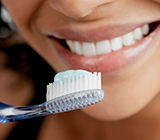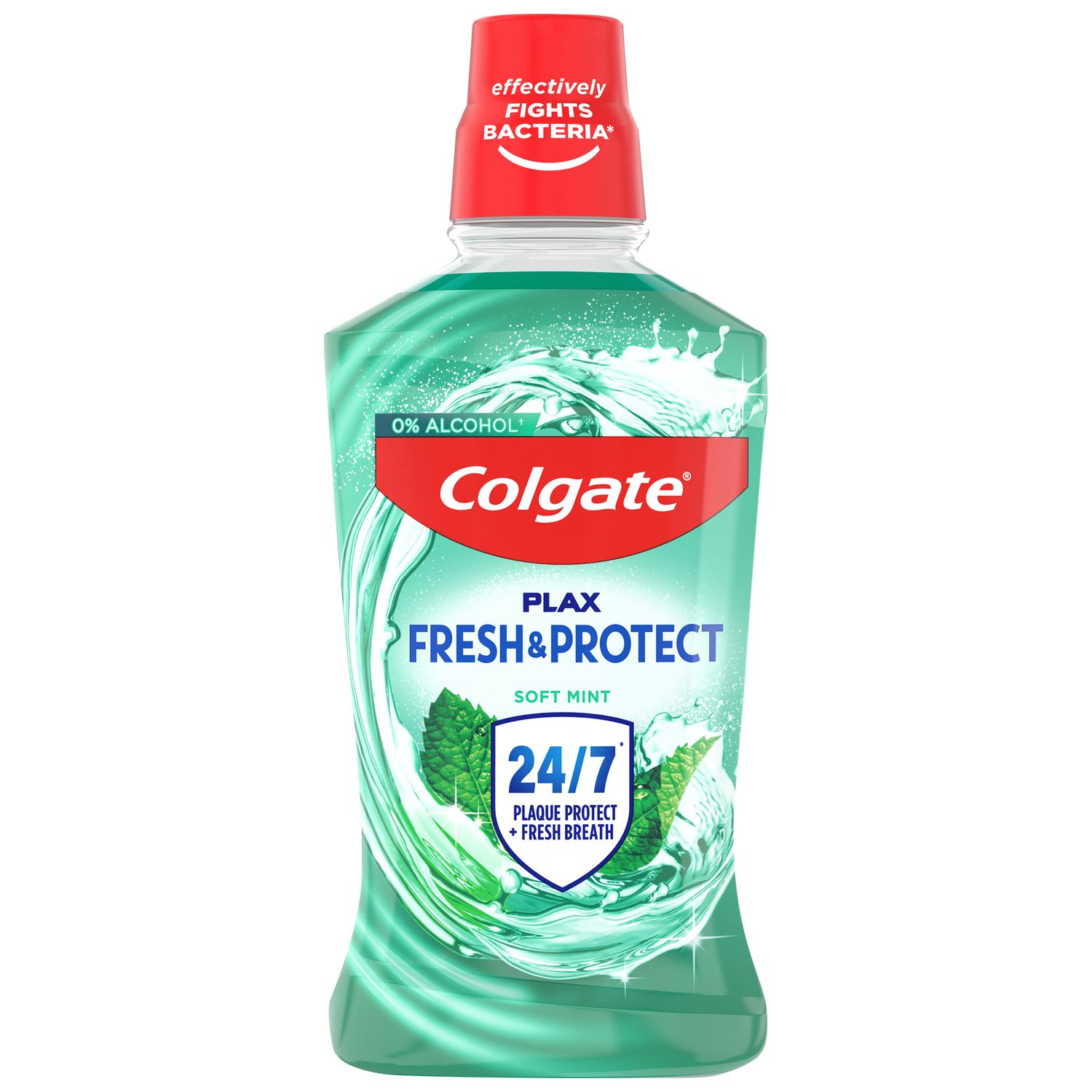Treating your teeth with fluoride is a very important part of an oral care routine. But what does fluoride do? Read on to find out more about what a fluoride treatment involves, the benefits of fluoride and more.
What is fluoride?
If you thought fluoride was just a synthetic chemical added to many oral care products, you’re not alone. Actually, fluoride is a naturally occurring mineral that’s found throughout the Earth's crust and widely distributed in nature. Some foods and water supplies also contain fluoride, and it's equally important for the oral health of both adults and children. Using oral care products that contain fluoride, like toothpaste and mouthwash, can help to strengthen your teeth and reduce your risk of tooth decay.
What foods contain fluoride?
Fluoride occurs naturally in some of the foods we eat and things we drink. You’ll find fluoride in:
- Grapes and raisins
- Fruits, including apples, strawberries, cherries, bananas, peaches and watermelon
- Vegetables, including spinach and potatoes
- Seafood, like prawns and crab legs
- Black tea and coffee
What is fluoridated water?
Water that has had fluoride added to it is known as fluoridated water. The effectiveness of fluoride in fighting cavities was discovered in the 1930s, when researchers found that children who grew up drinking naturally fluoridated water had less tooth decay than people living in areas without fluoridated water. Studies since then have repeatedly shown that when fluoride is added to a community's water supply, tooth decay decreases. Fluoride may also be added to bottled water.
The American Dental Association, the World Health Organization and the American Medical Association, among many other organisations, have endorsed the use of fluoride in water supplies because of its effect on tooth decay. It's even been referred to as "nature's cavity fighter," according to the American Dental Association (ADA).
How does fluoride work?
The “how” behind the fluoride gets a little more technical – let’s dive in. Fluoride works during the demineralisation and remineralisation processes that naturally occur in your mouth. The demineralisation process is started by the bacteria in the plaque on your teeth. Bacteria feed on sugar and other carbohydrates in your mouth and produce acidic saliva that weakens tooth enamel. Fluoride helps control and protect against the damage caused by the demineralisation process, keeping teeth strong and resistant to bad bacteria.
What are the benefits of fluoride?
Fluoride can strengthen your tooth enamel and reduce your risk of developing tooth decay by around 25%. Some of the other benefits of fluoride include:
- It remineralises tooth enamel
- It reverses the early signs of tooth decay
- It can slow down the demineralisation of tooth enamel
- It can prevent cavity-causing bacteria from growing
Origin of fluoride: fluorine
So, now you know more about fluoride, but what is fluorine? Fluorine is a highly reactive element. Because it's so reactive in its elemental form, fluorine easily forms compounds. One of fluorine’s most well-known compounds is fluoride. This means that fluoride is a natural ingredient when used in fluoride toothpaste.
Some examples of fluoride compounds include calcium fluoride, sodium fluoride, sodium monofluorophosphate and stannous fluoride. Sodium fluoride and stannous fluoride are the two most commonly found in toothpaste.
How does fluoride strengthen teeth?
When you use a fluoride toothpaste, the fluoride ends up in your saliva. When your teeth are coated in that saliva, the enamel (the outermost layer of the teeth) ends up absorbing the fluoride. Once there, the fluoride bonds with the calcium and phosphate that naturally exist in your enamel to create fluorapatite, which is a strong material that can resist decay and help prevent cavities.
Is fluoride safe?
Fluoride is safe and effective when used properly and in appropriate doses, but like most things, it’s possible to get too much of a good thing. After decades of research, the main risk linked to fluoride overuse is dental fluorosis, a condition that kids can develop if they're exposed to excessive fluoride for an extended period of time when they're too young.
Affected children may have teeth with white spots or lines, and in some cases, even brown or grey discoloration on the enamel of their teeth. Water fluoridation systems in developed countries are checked to maintain safe fluoride levels, so fluorosis can occur when children swallow too much fluoride toothpaste. That’s why it's important to supervise them while they're brushing to ensure they're spitting along the way.
Why fluoride is safe
The safety and benefits of fluoride are well documented, however, some people still choose to use a fluoride-free toothpaste. There has never been any scientific evidence linking fluoride to adverse health effects when consumed in the correct amounts. In fact, the evidence consistently shows that fluoride is safe and effective in the amounts your toothpaste and household tap provides.
According to the American Dental Association (ADA), more than 125 organisations around the world recognise its safety and value. These organisations include the ADA, the American Medical Association and the World Health Organisation.
Fluoride treatments & supplements
Getting a fluoride treatment at the dentist or taking fluoride supplements can improve your oral health, especially if you live in an area without fluoridated water.
Fluoride treatment
You have a few options when it comes to fluoride treatments. Topical fluoride products are applied directly to the teeth, and they include toothpaste, mouthwash and professional fluoride treatment at the dentist. Although they're only in the mouth for a short time, a topical fluoride treatment causes fluoride levels in the mouth to remain higher for several hours after use.
As long as you have healthy teeth to begin with, the combination of fluoridated drinking water and fluoride toothpaste is usually enough for your daily routine. If your tap water isn't fluoridated, or if you drink bottled water that doesn't contain fluoride, your dentist may recommend in-office fluoride treatments to make sure you're getting the protection you need.
Professional fluoride treatments are applied as a gel, foam or varnish. The fluoride used for these treatments has a higher strength than prescription or over-the-counter mouthwashes or toothpastes and should only be applied by a professional.
Fluoride supplements
If you’re worried that your child isn’t getting enough fluoride, ask your dentist about a prescription for fluoride supplements. Fluoride supplements are best for children between 6 months and 16 years old who do not drink fluoridated water. They’re available in liquid form for younger children and tablets for older children and teens.
A dentist can also prescribe fluoride rinses and gels if your child needs a higher level of fluoride than supplements can provide. Either way, always make sure to carefully supervise your children when they use any fluoride product and keep fluoride supplements out of reach from children.
Proper oral health starts with a good plan of attack. That means brushing at least twice a day and flossing daily to remove plaque that collects between each tooth, and don’t forget to schedule regular dental cleanings.
This article is intended to promote understanding of and knowledge about general oral health topics. It is not intended to be a substitute for professional advice, diagnosis or treatment. Always seek the advice of your dentist or other qualified healthcare provider with any questions you may have regarding a medical condition or treatment.
ORAL HEALTH QUIZ
What's behind your smile?
Take our Oral Health assessment to get the most from your oral care routine
ORAL HEALTH QUIZ
What's behind your smile?
Take our Oral Health assessment to get the most from your oral care routine













